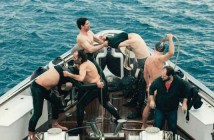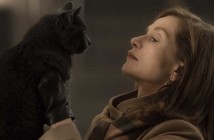Cast: Vanessa Paradis, Kevin Parent, Hélène Florent
Director: Jean-Marc Vallée
Country: Canada | France
Genre: Drama | Romance
Official Trailer: Here
Editor’s Note: For an alternative take on Café de Flore, see Julian Wright’s review
My local art house cinema—a small, single screen establishment that can manage to show but two films a week—was responsible for my viewing the Café de Flore trailer at least half a dozen times in the weeks running up to its release. Where normally such over-exposure sours the mind against forthcoming attractions, there was a certain intoxicating effect in hearing over and again Sigur Rós’ “Svefn-g-englar” played over the soft, shallow-focus imagery of Jean-Marc Vallée’s film in these tantalising little chunks. The passion of love flows forth from his camera, abundantly evident in the trailer alone; he brings an immense sensuality to his scenes, bringing visual manifestation to the underlying ideas of this bipartite tale.
As Jacqueline, the unwaveringly supportive single mother of her Down’s syndrome-afflicted son Laurent, Paradis exudes the very love around which the film rotates. She beautifully communicates the pain of a mother spurned when Laurent begins to fall for a classmate, the dejected sense of under-appreciation heavy in her eyes.
 For all the enticing flair Vallée exhibits behind the camera, the film’s strongest suit is the toweringly emotive work of Vanessa Paradis. As Jacqueline, the unwaveringly supportive single mother of her Down’s syndrome-afflicted son Laurent, Paradis exudes the very love around which the film rotates. She beautifully communicates the pain of a mother spurned when Laurent begins to fall for a classmate, the dejected sense of under-appreciation heavy in her eyes. Impressive too is Kevin Parent, whose role as successful DJ Antoine in modern-day Montreal form the centre of the film’s other, intercut narrative half. Torn between familial love and the fiery burn of passion, he moves constantly from his ex-wife and children to his new girlfriend and back.
For all the enticing flair Vallée exhibits behind the camera, the film’s strongest suit is the toweringly emotive work of Vanessa Paradis. As Jacqueline, the unwaveringly supportive single mother of her Down’s syndrome-afflicted son Laurent, Paradis exudes the very love around which the film rotates. She beautifully communicates the pain of a mother spurned when Laurent begins to fall for a classmate, the dejected sense of under-appreciation heavy in her eyes. Impressive too is Kevin Parent, whose role as successful DJ Antoine in modern-day Montreal form the centre of the film’s other, intercut narrative half. Torn between familial love and the fiery burn of passion, he moves constantly from his ex-wife and children to his new girlfriend and back.
The richness of Vallée’s style makes easy viewing of Café de Flore, its sumptuous aesthetic and the brooding moodiness of its tone well complemented by the melancholy longing of its soundtrack. Music is particularly important to the story, not only in the significance of Antoine’s occupation, but also in the relationship of Laurent and Jacqueline. The strength of their bond is solidified by a particular piece of music they listen to together; it’s emblematic of the way the film as a whole is held together by these “background” elements, its consistent strength of style managing to mask the bothersome issue that arises as regards its substance.
Without evenly posed halves, the ensuing entanglement on which the film concludes comes across more as a crutch by which to support a modern subplot than a satisfying and natural final note.
 The problem with films structured in this manner is a difficult one, the omnipresent question of how and when narrative conjunction is to be broached—for inevitably it must be—more often than not overriding all else in the plot. The anticipation of the story strands being tied together can be far more interesting than those strands themselves, a fate plainly suffered in the film’s more modern half. It’s not that Antoine’s share of the running time is disinteresting, it’s just not the kind of involving character piece that could support its own film as Jacqueline’s could, his difficulty in deciding between the women in his life requiring a strength of character he simply fails to exhibit. Without evenly posed halves, the ensuing entanglement on which the film concludes comes across more as a crutch by which to support a modern subplot than a satisfying and natural final note. It hardly helps that it’s so intrinsically dependent on full emotional connection with these characters: Vallée asks much of us in his concluding moments, his call for suspension of disbelief a trying one, but has he really supplied us with enough beforehand to earn it?
The problem with films structured in this manner is a difficult one, the omnipresent question of how and when narrative conjunction is to be broached—for inevitably it must be—more often than not overriding all else in the plot. The anticipation of the story strands being tied together can be far more interesting than those strands themselves, a fate plainly suffered in the film’s more modern half. It’s not that Antoine’s share of the running time is disinteresting, it’s just not the kind of involving character piece that could support its own film as Jacqueline’s could, his difficulty in deciding between the women in his life requiring a strength of character he simply fails to exhibit. Without evenly posed halves, the ensuing entanglement on which the film concludes comes across more as a crutch by which to support a modern subplot than a satisfying and natural final note. It hardly helps that it’s so intrinsically dependent on full emotional connection with these characters: Vallée asks much of us in his concluding moments, his call for suspension of disbelief a trying one, but has he really supplied us with enough beforehand to earn it?
The answer, courtesy of his merits as an appreciably cinematic storyteller, is a muted yes; Café de Flore has issues aplenty in using these stories to make its points about love, but the fact remains that there is a point, and Vallée steers us toward it with undeniable talent. The cast—Marin Gerrier and Alice Dubois as the young lovers cannot be praised enough—and the emotions they commute, the cinematography and the lushness of the soundtrack: all combine to form a film of considerable beauty, robbed of the greater resonance it ought to have managed by a lagging story unfit to be matched with its better half. There’s a great movie to be made of this idea, sadly Café de Flore isn’t it.
[notification type=”star”]67/100 ~ OKAY. Café de Flore has issues aplenty in using these stories to make its points about love, but the fact remains that there is a point, and Vallée steers us toward it with undeniable talent.[/notification]



